
Artificial intelligence (AI) is everywhere now, so publishing AI-written articles is an obvious temptation.
The speed and efficiency of AI writing tools are breathtaking. Why spend hours writing an article when you can do it in less than 30 seconds?
But therein lies the problem. It’s too easy, and taking the easy way in anything is almost always the least effective route.
For sure, there’s nothing to stop you from publishing as many AI articles as you like. But to what end?
Publishing AI-written articles is a bad idea
We all see Google and Bing search engines now using AI in search results.
You might think that if it’s okay for them to publish AI-derived content, it’s okay for you too.
It’s a reasonable conclusion, but unfortunately, not everything in life is fair, and you can’t always fight fire with fire.
The big difference is that search engines are the ultimate judge of whether they index your articles and how well they rank.
As a writer, you don’t have any power to judge search engines.
What also makes AI articles a bad idea is that they are so easy to identify.
You can find many free AI detectors online now, which while not always accurate, are a good guide.
However, Google and Bing use much more sophisticated tools to identify AI content, so it’s a good bet that your articles may not get indexed.
If you aim to publish lots and lots of content very quickly, go ahead. There’s no rule against you doing so.
But you might be disappointed if you want people to find and read your articles because search engines will probably ignore them.
How to use AI to write effective articles
AI technology is with us now, and it’s not going away, so writers need to adapt.
But there are growing pains.
I’m sure you have read many articles in the news about problems with AI-generated content.
However, issues like this occur because trusting the accuracy of a generative pre-trained transformer (GPT) tool is a mistake.
Not only can it often get facts wrong, but it also writes in an impersonal voice.
But if you are aware of the limitations, you can definitely use AI to help you write terrific articles and content.
You can start by using ChatGPT or Bing Chat to outline the key points you need to cover.
I often find that there are points I hadn’t considered.
Then, if you want to, you can get the chatbot to write a draft article based on your list of key points.
One trick I have learned for articles is to add a prompt to write in the second person point of view.
In seconds, you’ll have a draft to work with. But remember, it’s only a draft, not the finished product.
Now copy and paste the text into your word processor.
Then rewrite (almost) every sentence in your voice and writing style.
At the same time, don’t forget to check all the facts.
You are always judged by your words
Yes, writing is a process, but AI can make writing articles faster than starting from scratch.
In my experience, I find that using only the suggested key points is enough to help me write good articles.
Here’s an example I used for a recent article about the ellipsis in writing.
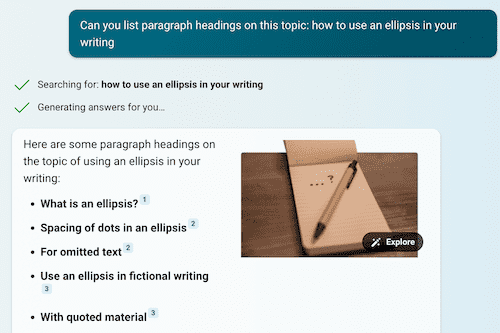
I paste the suggestions into my word processor and use them as a guide and framework for the new article.
Yes, it’s a bit slower, but the quality of the article is usually much better and more likely to be indexed by search engines.
As proof, my article about the ellipsis was indexed immediately by Google and already has 154 attributed search phrases, with many ranking on the first page of Google Search.
But conversely, I used a small chunk of ChatGPT text in another article to highlight how Bing Chat composer performs to produce text and images.
Even though the Bing AI text was only a fraction of the content and clearly marked, the article ranked badly.
Luckily, Google indexed the article, but it only has a few search terms that rank extremely low.
Surprisingly, most AI detectors I used to test this article came back with 90% human writing.
But I have a suspicion that Google is still wary of any form of automated writing.
Positive uses for AI in writing
I might be getting a bit long in the tooth, but it doesn’t stop me from adapting to new technologies.
At first, I was most reluctant to use AI to help me write, but I’m slowly coming around to the realities of today.
I’m not alone here. At first, Google said that AI-generated content was spam.
But a year later, Google changed its stance and stated that it will reward high-quality content, however it is produced.
So perhaps you could take from this that it’s not the tools you use but how you use them.
For me, the best uses are for finding examples, quotes, statistics, and relevant information faster than using Google or Bing search.
As an example, I was writing an article about an expression that is often used incorrectly. I had written a few examples but needed some more.
ChatGPT produced a list of sentences that gave me many more ideas.
Other uses include finding quotes from literature or famous people, or even as a free grammar checker.
As for facts, it’s sometimes faster than a search engine because I don’t have to scan through blog posts or articles for the information I want.
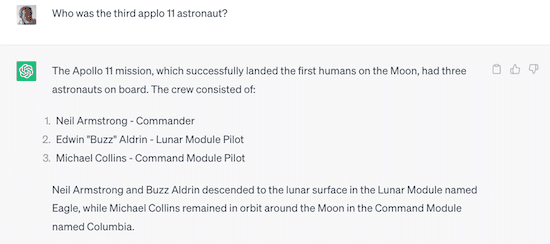
But I always double-check. In this case, I checked with Wikipedia.
In the end, using AI to help you write is not a bad thing at all. It can speed things up and help you write more complete articles.
But there’s always the inherent risk of factual errors.
Checking your articles for AI content
If you use AI in any way to help you write content, blog posts, articles, or even ebooks, it pays to check.
You can find many free AI detectors online now, so you have plenty of choices.
I have developed a new habit of checking anything I write before I publish, even though I never publish copy-and-paste AI-written articles.
But the results can be a bit flaky. I checked a couple of articles I wrote five years ago, and one checker marked passages as “potentially AI.”
That’s why it’s best to do two or three checks if you can.
Here are two examples of checking the draft text I produced for this article using ChatGPT.
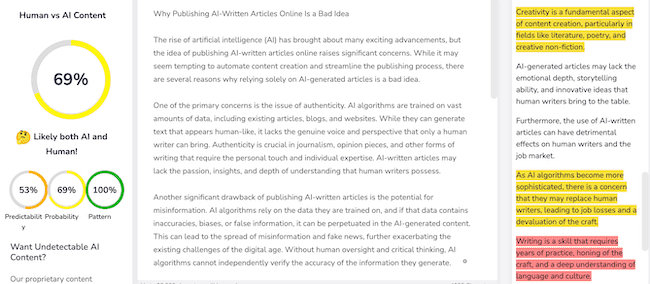
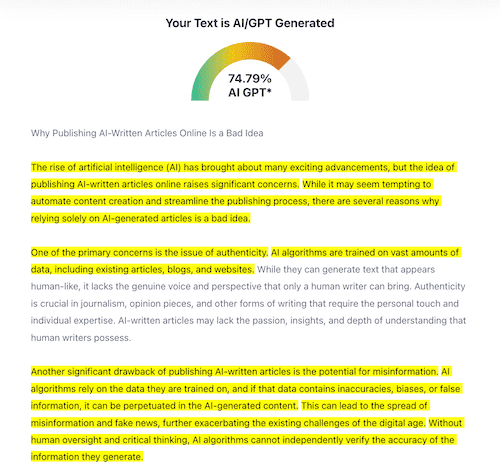
As you can see, both tests identified a lot of AI-generated text.
Then I checked this article, which I have almost finished writing now.
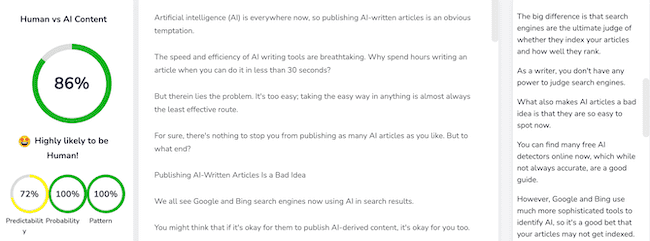
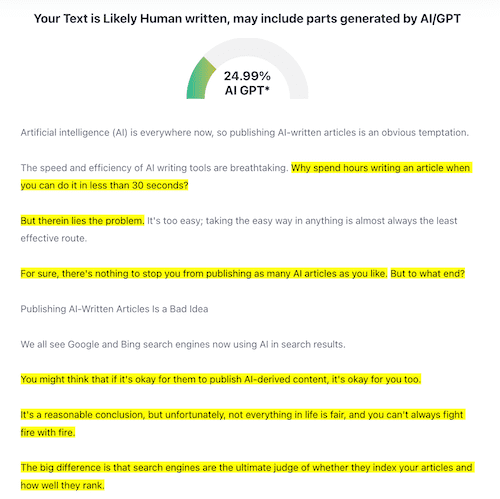
You can see the differences in the results that give a reasonable indication of whether a text is human or AI-written.
It’s certainly not foolproof, but it’s better to be on the right side of the ledger if you want your articles to rank on search engines.
Summary
Yes, we know that many people, companies, and corporations now publish AI-written articles and even ebooks at scale.
It’s a natural reaction to use new technology to try to cut costs and increase output.
But while it seems like an incredibly tempting idea, the results are not always profitable and, in fact, can be detrimental to a site’s reputation.
I use AI tools, but in moderation and only when they can help me write better, more accurately, and completely.
Do they save me time? Yes, but not that much in the end.
This article runs to around 1,400 words and has taken me two and a half hours to write, not including editing and image preparation.
I could have possibly produced twenty articles in that time using ChatGPT or Bing Chat. But why bother if none of them rank or gain readers?
Publishing tons and tons of content for the sake of it serves no real purpose.
In the end, it’s not the technology or what it can do that matters. It’s what you want your writing to achieve that counts the most.
You can only meet that goal by writing well and writing for your readers, with or without technology.
Related Reading: Bing Chat Content Creation Is Amazing And Scary



